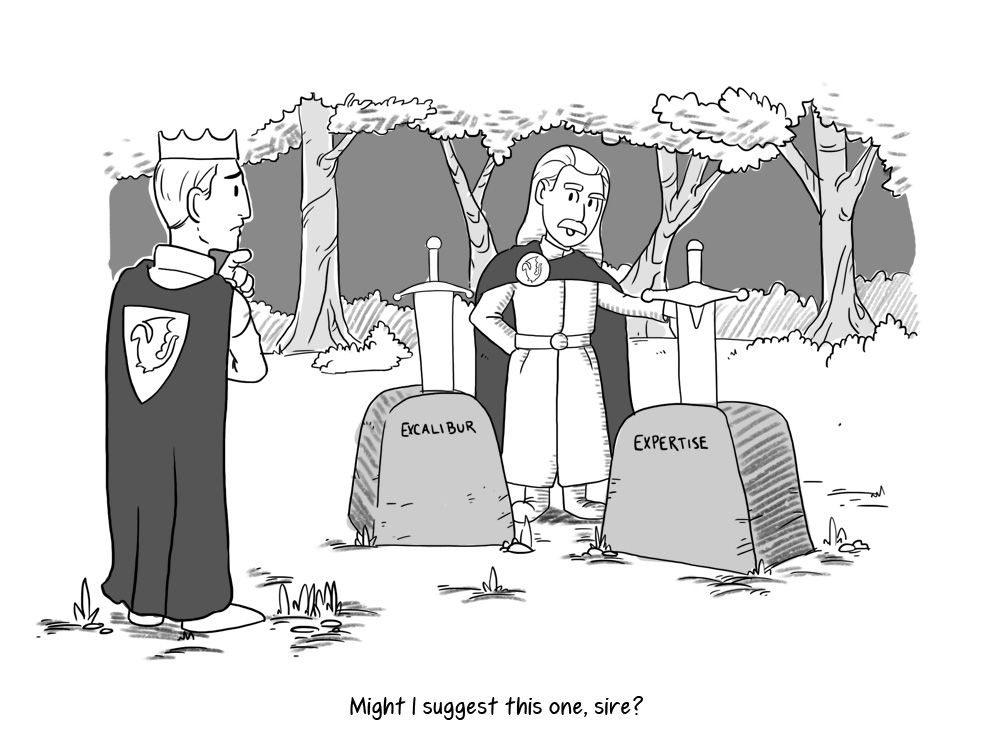December 2014
Despite the ever increasing array of accreditations in the investment business, there simply aren't any that match those of law or medicine for being reliable marks for high levels of expertise. The Chartered Financial Analyst (CFA) certification comes closest in terms of analytical rigor and practical experience, but falls far short in public awareness. As a result, investors must contend with an almost unbelievably wide dispersion of ability from the universe of investment "professionals".
Also complicating the search for expertise is a wide array of jobs in the investment industry upon which expertise is often unjustifiably conferred. Bankers, traders, brokers, financial planners, wealth managers, portfolio managers, and analysts are all referred to as investment "professionals" with the connotation being that these people are also experts. Sometimes the association with expertise is well-deserved, but often it is not. What’s worse is that each of these job titles can mean vastly different things and have vastly different qualifications whether in reference to a bank, a brokerage firm, or an asset manager. If you don’t always completely understand what someone does or how much they might know, don’t feel bad; it’s incredibly confusing.
For many years this confusion didn't really matter very much. Declining interest rates and strong economic growth ensured that most investments did well regardless of who was "managing" them. In a humorous commentary on the times, Jim Ware, author of High Performing Investment Teams, flippantly remarked in a presentation to a group of CFAs that, "During the '90s, Forrest Gump could have managed a successful investment firm." Not missing a beat, an audience member shot back, "He did!"
In the absence of the prominent tailwinds to equity returns of the ‘80s and ‘90s and with the prospect of a much wider array of possible investment outcomes, investors are faced with increasingly difficult decisions. In such an environment, good results don’t just happen on their own. Doing the wrong thing can be costly, but doing nothing can be even worse.
Given the importance of decision making, it is also somewhat odd that there is so little formal attention given to the endeavor. It is not taught at schools and only rarely studied.
Fortunately, Gary Klein goes a long way to filling this important knowledge gap with his book, Sources of Power. By weaving lessons learned from high-stress jobs such as firefighting, aviation, and military conflict with academic research, Klein identifies many useful insights. For example, he finds that neither biases nor stress play a significant role in poor decisions. Rather, what matters most is adequate knowledge and expertise. As he says, "Most poor decisions may result from having inadequate knowledge and expertise."
This is a hugely important finding. When all you need to do is to hoist a sail in order to harvest great investment returns, almost everyone makes nice progress. Exposure is the only decision and often that happens by default. When conditions get a lot choppier, though, the quality of decisions becomes much more important. Expertise matters because it enables quality decisions in difficult circumstances — which often leads to significantly differentiated outcomes.
Although expertise may be hard to identify in the investment industry for various reasons, most of us have some notion of what it looks like in general. Klein gives us a taste: "Experts know how the official records are compiled, whether they are maps, computer manuals, diagnostic tests, or air crew checklists. They know when steps have to be followed and when to make exceptions." This is a useful start.
Klein further captures the nature of expertise through the title of his chapter on the subject, "The Power to See the Invisible.” In that chapter, he provides a useful list of the types of things experts see that novices do not:
- Patterns that novices do not notice
- Anomalies -- events that did not happen and other violations of expectancies
- The big picture (situation awareness)
- The way things work
- Opportunities and improvisations
- Events that either already happened (the past) or are going to happen (the future)
- Differences that are too small for novices to detect
- Their own limitations.
Situational awareness is also an extremely important manifestation of expertise. Non-experts may look at things like debt levels and feel comforted by the fact that increases don't seem especially large or that because interest rates are low, there is little sign of danger. Experts, in contrast, know that debt is an especially pernicious problem because the relationship between debt and outcomes is non-linear. In other words, beyond a certain level of debt, relatively small catalysts can cause disproportionately negative outcomes. By analyzing debt in relation to both assets and income, and by comparing these relationships across time, experts gain a much greater perspective on the risks inherent to a given investment situation.
Often too, there are patterns in the market that novices don't notice. Non-expert investors, for instance, often tend to view prices of stocks just as they would prices of consumer goods. While fundamental underlying value is certainly a component of stock prices just like of consumer goods, stock prices are different because they are traded actively in a market -- which is very different than being set by a retailer. Experts realize stock prices can fluctuate rapidly and wildly from their fundamental underlying values based upon patterns in trading volume, market structure, and market sentiment. Most of these patterns are invisible if one only looks at prices and the magnitude of deviation between prices and fundamental values is invisible without valuation expertise.
Pulling these ideas together, we can see that expertise is a hugely important factor in successful investing (as in many endeavors). As Klein describes, "In aviation, there is a term to describe people who are so wrapped up in what they are doing that they are insensitive to what lies ahead: flying behind the plane. It describes people who are either so novice or so overworked or have such poor situation awareness that they are not generating expectancies; they are not preparing themselves properly.” This provides an informative and hopeful message for investors: There is nothing magical about preparing properly for your financial goals; you just need to find access to investment expertise to help inform important decisions.



 RSS Feed
RSS Feed